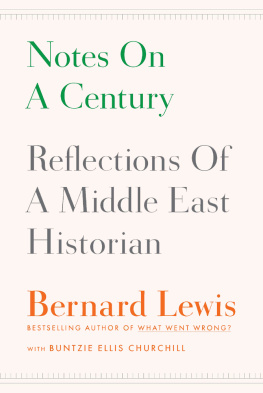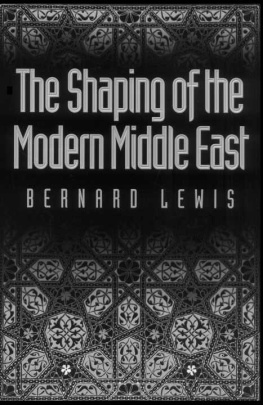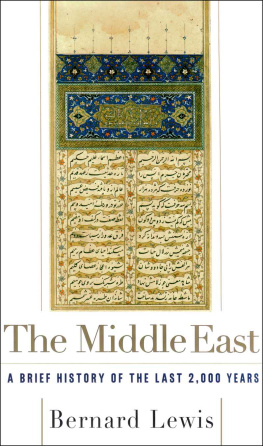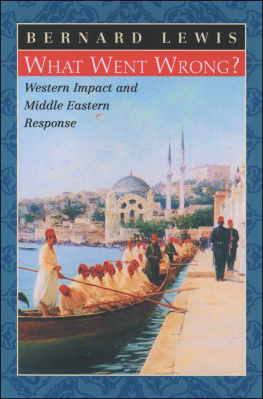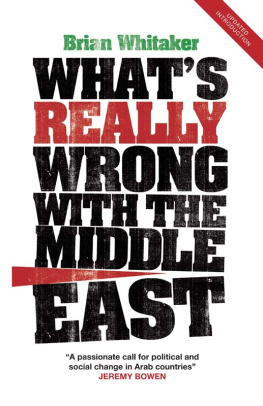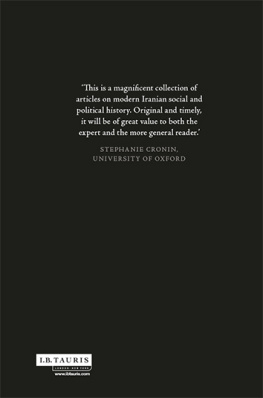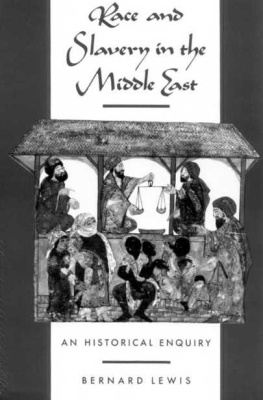NOTES
ON A
CENTURY

NOTES
ON A
CENTURY
Reflections of a
Middle East Historian
Bernard Lewis
with Buntzie Ellis Churchill
VIKING
VIKING
Published by the Penguin Group
Penguin Group (USA) Inc., 375 Hudson Street,
New York, New York 10014, U.S.A.
Penguin Group (Canada), 90 Eglinton Avenue East, Suite 700, Toronto,
Ontario, Canada M4P 2Y3 (a division of Pearson Penguin Canada Inc.)
Penguin Books Ltd, 80 Strand, London WC2R 0RL, England
Penguin Ireland, 25 St. Stephens Green, Dublin 2, Ireland
(a division of Penguin Books Ltd)
Penguin Books Australia Ltd, 250 Camberwell Road, Camberwell,
Victoria 3124, Australia (a division of Pearson Australia Group Pty Ltd)
Penguin Books India Pvt Ltd, 11 Community Centre,
Panchsheel Park, New Delhi110 017, India
Penguin Group (NZ), 67 Apollo Drive, Rosedale, Auckland 0632,
New Zealand (a division of Pearson New Zealand Ltd)
Penguin Books (South Africa) (Pty) Ltd, 24 Sturdee Avenue,
Rosebank, Johannesburg 2196, South Africa
Penguin Books Ltd, Registered Offices: 80 Strand, London WC2R 0RL, England
First published in 2012 by Viking Penguin, a member of Penguin Group (USA) Inc.
1 3 5 7 9 10 8 6 4
Copyright Bernard Lewis and Buntzie Ellis Churchill, 2012
All rights reserved
Photographs courtesy of Bernard Lewis unless otherwise indicated.
LIBRARY OF CONGRESS CATALOGING IN PUBLICATION DATA
Lewis, Bernard.
Notes on a century : reflections of a Middle East historian / Bernard Lewis;
with Buntzie Ellis Churchill.
p. cm.
Includes index.
ISBN: 978-1-101-57523-9
1. Lewis, Bernard. 2. Middle East specialistsGreat BritainBiography. 3. Middle EastHistoriography. 4. Middle EastHistory20th century. 5. Middle East
History21st century. I. Churchill, Buntzie Ellis. II. Title.
DS61.7.L48A3 2012
956.007202dc23
[B] 2011049267
Printed in the United States of America
Set in Adobe Garamond Pro Designed by Francesca Belanger
No part of this book may be reproduced, scanned, or distributed in any printed or electronic
form without permission. Please do not participate in or encourage piracy of copyrighted
materials in violation of the authors rights. Purchase only authorized editions.
Penguin is committed to publishing works of quality and integrity.
In that spirit, we are proud to offer this book to our readers;
however, the story, the experiences, and the words
are the authors alone.
ALWAYS LEARNING
PEARSON
For Buntzie,
without whose inspiration and guidance
this book would not have been written or even started
and without whose presence and participation
this last and best part of my life
could not have been lived.
One grey hair appeared on my head
I plucked it out with my hand.
It answered me: You have prevailed against me alone
What will you do when my army comes after me?
Yehuda Halevi
Lord, of your grace all that I hope is this
Keep the realm of my pleasure prosperous
Avert from me the calamity of chastity
And keep far from me the doom of repentance.
Ubayd-i Zakani
Excerpts from Music of a Distant Drum
Acknowledgments
I thank my friends and colleagues whose encouragement, over many years and in many places, contributed so much to the life described in these pages.
David Pryce-Jones was kind enough to let me quote extensively from his article Enough Said, and Adam Garfinkel graciously permitted me to reprint my article from The American Interest (spring 2006), with minor changes.
A word of thanks to Mari Steed and Denise Bala for invaluable technical assistance.
Finally, special thanks are due to my editor, Joy de Menil, whose rigorous scrutiny removed defects and added merits to the manuscript.
The Typewriter
Sometimes the machine stares back at me
Somber, silent
A hint of menace?
Sometimes it works with me,
Anxious, eager
For reassurance.
Sometimes it sits in judgment
Hearing, condemning
Pondering sentence.
Introduction
D uring my long life I have been principally concerned with the study of the Middle East. This interest began when I was still a schoolboy. It has grown ever since, becoming first a hobby, then an obsession, finally a profession. I have tried from the start to understand the society from withinby learning its languages, reading its writings, visiting its countries, talkingand listeningto its people.
In accomplishing these purposes, I derived considerable advantage from the time, place and circumstances of my birth and therefore of my early education. In England in those days, history was an important part of education, and we were expected to have at least an outline knowledge not just of recent and current events, but of the whole sweep of recorded and remembered history of Western civilization, from classical antiquity to the present day. Not only that, but we were expected to study at least part of it in the original languages, notably French and Latin, to which some of us later added German and Greek. King Alfred, William the Conqueror, Richard the Lionheart and the Crusades were a familiar part of everyday discourse. This did not prepare me for the study of Islamic history; indeed in a sense, by inculcating a Christian, European perception, it biased me against it. But it did give me a better understanding of the nature of the historical process, the purpose and manner of historical research and writing.
In my early studies I was mainly interested in medieval history, in the period when the Islamic Middle East was most different from the West, least affected by the West, and in most respects far in advance of the West. I never lost my interest in medieval Islamic history, but it is no longer my primary concern. The opportunity to enter the hitherto sealed Ottoman archives in 1950 was too good to miss; it provided me with a chance to pursue a topic in which I was already deeply interestedthe history of the Ottoman Empire. Most of my published work since then has been on the Ottoman and modern periods, or some combination of the two.
But no specialist on the Middle East, not even an Assyriologist or an Egyptologist, can wholly ignore the contemporary scene. My war service gave me an intimate knowledge of some aspects of modern Middle Eastern life and politics. My travels in Middle Eastern countries, my discussions with Middle Eastern leaders, my meetings with Middle Eastern colleagues, and, perhaps most of all, my encounters with Middle Eastern students, and later with former students, kept me in touch with what was going on. From time to time, I ceded to the temptation to make some public pronouncement on Middle Eastern events, usually in the form of an interview or article in some review or magazine or, occasionally, newspaper. And I have occasionally written at greater length on recent and contemporary topics.
For the study of Middle Eastern history, and at the present time one might even add of world history, some knowledge of Islams origins and of its scriptures is necessary. Already in my student years I was reading the Koran, the biography of the Prophet, and the extensive literature concerned with them. But at no time did I specialize in these topics. I am not an expert in theology or scripture, and I looked at these, if at all, only with a historians eye. I am, by vocation and profession, a historian, principally interested in the history of civilization.

